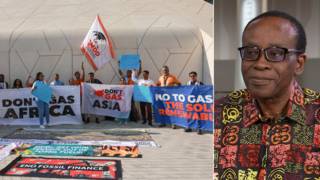
Guests
- Nnimmo Basseyexecutive director of Environmental Rights Action in Nigeria, which monitors spills around the country’s oil-rich southern delta. He is also chair of Friends of the Earth International.
Links
Communities along Nigeria’s Niger Delta have been put on alert following a major oil spill from the oil giant, Shell. The massive oil slick is making its way to the Nigerian coast, threatening local wildlife and massive pollution along the shore. Much of the available information about the spill comes from the company responsible for it, Royal Dutch Shell, which says less than 40,000 barrels have leaked so far. But Nigeria’s National Oil Spill Detection and Response Agency says the spill could be three times as large. It comes just four months after the United Nations said it would take 30 years and around $1 billion for a small section of the delta to recover from environmental damage caused by Shell and other companies. We get an update from Nnimmo Bassey, executive director of Environmental Rights Action in Nigeria, which monitors spills around the country’s oil-rich southern delta. [includes rush transcript]
Transcript
AMY GOODMAN: Communities along Nigeria’s Niger Delta have been put on alert following a major oil spill from the oil giant Shell. Satellite images indicate the spill may be the worst in the area in over a decade. The massive oil slick is making its way to the Nigerian coast, threatening local wildlife, massive pollution along the shore. Shell says less than 40,000 barrels have leaked so far, but Nigeria’s National Oil Spill Detection and Response Agency says the spill could be three times as large. Satellite images from the environmental group SkyTruth show as much as 2.4 million gallons of oil have spilled. The spill comes just four months after the United Nations said it would take 30 years and around a billion dollars for a small section of the delta to recover from environmental damage caused by Shell and other companies.
For more, we’re joined on the phone by Nnimmo Bassey, executive director of Environmental Rights Action in Nigeria, which monitors spills around the country’s oil-rich southern delta. He’s also chair of Friends of the Earth International, actually speaking to us today from the Gambia.
Nnimmo, welcome to Democracy Now! What do you understand has happened?
NNIMMO BASSEY: The spill that has occurred has been very serious, and fishermen and people on the coast are really troubled by the amount of crude coming onshore. At the same time, Shell is pretending that the spill has been contained and that they are dispersing the crude in the ocean. But the truth is that the spill is hitting the shores in very far and a wide range of places. In [inaudible], a place of the Niger Delta hit by [inaudible], and they are there still. Fishermen, according to people, are reporting spills. Our monitors are reporting ground onshore and along the coast, and we are seeing evidence of the crude that is coming from the Bonga field.
AMY GOODMAN: What exactly has Shell said? What are you demanding that Shell do? You have dealt with these oil spills for years in the Niger Delta, whether it’s Chevron, whether it’s Shell. Talk about Shell’s estimate of what’s taking place and saying that they have it contained. And if you could speak as clearly as possible. We’re having a hard time understanding you on the phone.
NNIMMO BASSEY: Well, since the spill occurred, Shell has sent out the information that they are—start cleaning the spill, that they are—they stopped the flow, and that they’re cleaning it up. And unfortunately, all they’ve done is just the talk, and the regulatory agencies in Nigeria are not in a position to verify, so far, if what they’ve claimed to have done has actually been done. In fact, Shell has told the world that this is the largest spill in 10 years, but that is not accurate. There’s been very large oil spills onshore. For example, in two instances near Ogoni, in 2008, 2009, there were over 300,000 barrels spilled. And in short, Shell are hoping to try to limit our memory to 10 years. In 1979, Shell spilled 570,000 barrels of crude oil in a part of the delta. And so, we’re having this continual round of oil spilling and without adequate responses going on, and Shell would prefer not to have people have the information. Now, unfortunately for them, they are not able to hide the information from the common sphere, because both from satellite images and reports from fishermen who go to the ocean for livelihood, these stories are coming out very clearly that in fact there is [inaudible]—
AMY GOODMAN: We will continue to follow this story, as we wrap up the show, Nnimmo. I want to thank you very much for being with us. He’s speaking to us from the Gambia, usually in Nigeria, if he’s not campaigning around the world, warning about this fossil fuel-based economy in Nigeria and in countries around the world. We last saw him in Durban, South Africa, at the climate change summit that was held by the United Nations. Nnimmo Bassey, executive director of Environmental Rights Action, chair of the board of Friends of the Earth International, author of To Cook a Continent.












Media Options